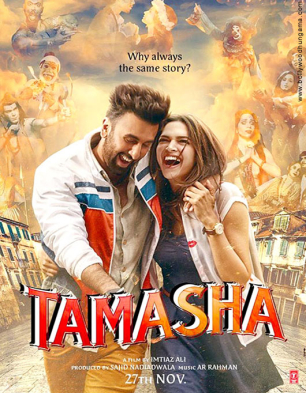Tamasha, Imtiaz Ali's film brings Bollywood's one of the favourite pair Deepika and Ranbir on screen. Tamasha certainly differs from his earlier films in spite of love being the central theme. Rather, he experiments with a different style of storytelling through Tamasha. Tamasha means spectacle. I loved the plot of the film, which focuses or reminds us that most of the time, we are mere spectators in our lives. We choose a gallery, where we can sit comfortably and just watch things happening in and around us. We don't even decide for ourselves. When we don't design our choices in our lives, somebody else makes choices for us. And if this is the case, do we enjoy these choices made by somebody on our behalf. Probably not. We just live our lives, fall prey to the monotonous way of living. We ignore the real 'us' and just compromise with the happenings of our lives. We ourselves don't recognize the real self and just pull through life by engaging in mundane activities and appear not to be bothered as well. Imtiaz Ali's film Tamasha tells us – "Your most personal thought is your life's biggest Tamasha". The concept is so nice, but the film falters at the execution level. Two terrific actors on screen could have set the stage on fire, but it doesn't happen so. Even the sequence where lot of fun elements could have been added was a bit dry. And the sequence, where emotions could have played a major role in getting the audience connected was underplayed. But certainly, this film can't be written off, watch it for the beautiful philosophy, which Tamasha brings to us and of course for its lead pair, Deepika and Ranbir.
The film begins with a troupe performing Tamasha on stage. The very initial scene itself makes the whole theme of the film very clear. The story telling happens through this Tamasha.
Ved as a kid in Shimla is extremely fond of stories. He would collect money, even steal money at times to pay a storyteller (Piyush Mishra) who would tell him stories of Ramayana, Laila Majnu, Heer Ranjha, Romeo Juliet etc. The interesting aspect of Piyush' storytelling was that he used to say that every story was the same. Ved used to passionately listen to the stories. As far as the studies are concerned, he is not very fond of many subjects especially Mathematics. But when he grows up, he yields to his father's pressure to pursue engineering.
The adult Ved's story begins in an exotic island – Corsica in France, where he happens to meet Tara (Deepika Padukone), who had lost her passport and some other belongings. Both of them hit it off at the very first instance. Ved wanted their story to be different from the regular ones, so they decide that they would not even reveal their real names, and tell any truth to each other. They only lie about themselves, Ved becomes Don and Tara becomes Mona Darling. They also had set the norm that they would never meet each other once they leave Corsica. But as expected, love blooms, though both of them don't accept that.
Tara returns to her home at Kolkata and joins her father's business. Ved goes to Delhi and joins a regular corporate job. She does feel Ved's absence around, but she is not being shown as a depressed girl, rather she is shown actively engaged in work. Although the scene is not very clear, but it shows her being true to her emotions by breaking off with her boyfriend or fiancée. The screenplay covers a period of four years through a song.
Tara lands up in Delhi for an assignment. 'Social' of Hauz Khas Village is the spot where she keeps coming, certainly with the hope of meeting Ved. And when she meets Ved, does she find the same Ved whom she met in Corsica. Though, they meet almost everyday, Tara is disillusioned with this Ved. She feels that the Ved who was always there with her since her return from Corsica was far different from this Ved. Tara was facing problem to accept this Ved who had succumbed to a conventional way of leading life, routine job. Tara wanted to highlight the point that Ved had the potential to do much beyond the routine things in his life. But Ved had a problem in accepting the external dimension of his 'self' from Tara.
What happens thereafter? How does Ved meets his real 'self'? How does Ved take charge of his life? How does he define his own internal dimension of 'self'? Does he give life to the storyteller within him? How does he move out of the shackles of the family / social expectations of being an engineer, pursuing a corporate job, being part of the rat race? How does Tara's love play a role in bringing the real Ved out? Does Ved ever feel liberated in life? If the story started in Corsica, and paths of the lead pair crossed at Delhi, where does the story reaches at the climax? Watch the film to get these answers.
Tamasha talks about one of the most intriguing philosophy of life that we as human beings tend to be mere spectators in our lives, allow others to design choices for us, stop following our own dreams and find ourselves in the shackles of the societal norms of following conventional rules. We may not be ready to explore our true potential, but someone who loves us, could take us to a great journey of self-optimization. Though, Tamasha, the spectacle, is not a debacle; I sincerely wished that such a beautiful philosophy could have been executed in a much better manner through a gripping screenplay.


